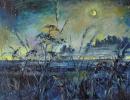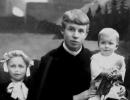Online reading of the book Collection of poems “The full moon has risen over the meadow.... Analysis of the poem Blok a full month has risen over the meadow Blok a full month has risen
A unique poem written in 1898, when Alexander Blok was still only 18 years old. The poet's early works were indeed written in simple language; symbolism came later, just as the morning comes after the night in his poem. At a young age, there is probably always a desire for mysticism, which justifiably reigns in nature.
A. Blok at the time of writing the poem is just in his family estate Shakhmatovo, where the moonlit nights brought an impression to the poet. In addition, Blok had feelings for Lyubov Mendeleeva; a soul in love always reaches out to something beautiful. In the future it will become clear that the poem could mean the poet's secret experiences.
The landscape even seems ominous and dark to the reader, but everything is not so frightening. The mysticism of nature creates a tension that cannot be explained. Even if you know that a bright and warm morning will come, the night still has a special atmosphere, it carries with it something mysterious. It is interesting to note that the tension that the author conveys in the poem is associated not only with mysticism, but also with the poet’s personal experiences of love; this can be caught between the lines. In addition, Blok seems to sense future adversity in the relationship. By the way, one cannot help but say that the poet himself admits that mysticism is present; he even connects this with several cases that subsequently allow the secret to come true. His prayers were heard - Blok married the woman he loved, L. Mendeleeva. A. Blok is a fairly receptive person; he believed in higher powers.
Alexander Alexandrovich Blok makes it clear in his early work that the night is charming and beautiful in its own way, but it is also alarming, as if threats lurk in the darkness of the night. Moreover, the poet does not hide his fears, some kind of trepidation before the kingdom of the night.
Analysis of the poem The full month rose over the meadow according to plan
You might be interested
- Analysis of Nekrasov's poem Recognition
- Analysis of Pushkin's poem Autumn
This work was created in 1833. It is considered one of the most difficult to present among the huge number of poems by A. S. Pushkin. This was the peak of his creativity, since it was already the second Boldino autumn season
- Analysis of the poem I wish I could get sick Akhmatova
The main motive of the poem “I wish I could get sick properly” is memory and a return to the past. The work is imbued with the desire to get sick, and not just to get sick, but to get sick “properly.”
- Analysis of the poem The Coming Huns of Bryusov
The poet Bryusov was known for his indifference towards various revolutionary movements, but he understood that society needed fundamental changes.
- Analysis of the poem Yesenin's green hairstyle
Yesenin’s lyrics clearly demonstrate the ability to humanize nature, to make natural phenomena similar to some elements of the human world and thus to connect, as it were, two semantic fields: human and natural.
The full moon rose over the meadow
An unchanging wondrous circle,
It shines and is silent.
Pale, pale flowering meadow,
The darkness of the night creeping across it,
Resting, sleeping.
It's scary to go out on the road:
Incomprehensible anxiety
Reigns under the moon.
Even though you know: early in the morning
The sun will emerge from the fog
The field will light up,
And then you will walk along the path,
Where under every blade of grass
Life is in full swing.
Analysis of the poem “The full moon rose over the meadow” by Blok
The work of Alexander Alexandrovich Blok “The Full Moon Rising Over the Meadow” is included in the poet’s debut book.
The poem was written in July 1898. Its author at that time turned 18 years old, he had already graduated from the gymnasium and turned his attention to St. Petersburg University. Meanwhile, he spends the summer at the Shakhmatovo estate near Moscow. This is a special place for him, covered with memories of childhood, his first feeling for L. Mendeleeva (later the poet’s wife). The genre is landscape lyricism, the meter is trochee with sweeping rhyme. The intonation ranges from mysterious to prosaic. The poem has a slight echo of the medieval rondo. The poem is built on antithesis, with the use of antonyms. There are both closed and open rhymes. The lyrical hero is the author himself, but he speaks about himself in the second person. The sketch begins almost fabulously: the moon over the meadow sheds a marvelous light on the surroundings, the meadow itself, having lost all its colors in the darkness, subdued, tolerates the darkness creeping “across it” (the awkward wording of the pronoun). However, this does not prevent nature from sleeping and resting. A lyrical hero appears: it’s scary to go out onto the road. The author does not explain the purpose of the planned walk. The reader can only guess why the hero has insomnia, what drives him out of the house, and why, finally, he is so scared. Anxiety born of the unrecognizability of the familiar world, defenselessness before the mysterious night life of everything that exists. The hero tries in vain to bring to mind the arguments of reason: in the morning the sun will emerge from the fog. A riot of colors, sounds and light will return. Diminutive suffixes emphasize the hero’s trusting attitude towards daytime nature: path, blade of grass. “Life is in full swing” (metaphor): nightly thoughts evaporate like a bad dream, they even seem a little funny. During the day, urgent worries, chores, and activities immediately appear. However, they do not awaken those thoughts and feelings, that inspiration that are possible at night. The vocabulary is sublime and neutral. Oxymoron: full month (not moon). Comparison: stood in a circle. Epithets: unchanged, incomprehensible (prefixed adjective). Lexical repetition, giving more drama to the work: pale, pale. Personifications: it shines and is silent, the sun will come out. Metaphor: anxiety reigns. Inversion: flowering meadow.
The poetry of the young A. Blok bears a clear imprint of the symbolism that dominated literature at that time.
“The full moon rose over the meadow...” Alexander Blok
The full moon rose over the meadow
An unchanging wondrous circle,
It shines and is silent.
Pale, pale flowering meadow,
The darkness of the night creeping across it,
Resting, sleeping.
It's scary to go out on the road:
Incomprehensible anxiety
Reigns under the moon.
Even though you know: early in the morning
The sun will emerge from the fog
The field will light up,
And then you will walk along the path,
Where under every blade of grass
Life is in full swing.
Analysis of Blok’s poem “The full moon rose over the meadow...”
It is difficult to imagine Alexander Blok as a landscape painter. Nevertheless. The early period of his work is marked by precisely such works. This is not surprising, since the 18-year-old boy is still just learning to feel and love, so he does not yet risk trusting his innermost thoughts to paper. However, the mental state of yesterday's high school student requires an outburst of emotions, so poems are born that are slightly naive and, at the same time, surprisingly beautiful.
The poem “The full moon rose over the meadow...”, written in the summer of 1898, can undoubtedly be attributed to such works. At this time, Alexander Blok, who successfully passed the entrance exams to the university, is visiting the Shakhmatovo family estate. He had not been here for several years, having forgotten how intoxicating the aroma of freshly cut meadow grass can be, and how much romance fraught with night walks under the moonlight. Moreover, his loneliness is brightened up by the young Lyubov Mendeleeva, for whom the 18-year-old poet has very tender feelings. He himself does not yet risk admitting that he is in love. However, this can easily be caught between the lines of a poem filled with sensuality and anticipation.
The dark August night in the author’s view is built on contrasts, since the darkness is attributed to moonlight, in which a “pale blooming meadow” is visible. The picture painted by the poet has a slightly sinister tone. And the author himself, who is not distinguished by his inclination towards mysticism, admits: “An incomprehensible anxiety reigns under the moon.” He seems to foresee that the summer romance, which began so easily and unburdenedly, will soon end with an unpleasant explanation and separation for several years, during which Blok will have to rethink his feelings, becoming confident in their strength and purity. In addition, the poet realizes that the notorious mysticism has nevertheless deeply descended into his life, since a series of random coincidences, ending with a marriage with Lyubov Mendeleeva, is an answer from above to the poet’s fervent prayers. But between the naive young man and the mature man into whom Alexander Blok will turn 5 years later, there is an abyss. Therefore, all the poet’s feelings remain unexpressed, and their echoes should be sought between the lines, catching only distant hints, unspoken thoughts and phrases ready to fall from the lips.
Mysticism, which will later develop into symbolism, is seen by Blok in such a simple phenomenon as the change of night and day. With the first rays of the sun, all the fears of the young poet go away, who sees how “life is boiling under every blade of grass.” But somewhere deep in the subconscious are hidden memories of a moonlit night, mysterious and not without charm, which still carries a hidden threat.
Alexander Alexandrovich Blok
The full moon rose over the meadow
An unchanging wondrous circle,
It shines and is silent.
Pale, pale blooming meadow,
The darkness of the night creeping across it,
Resting, sleeping.
It's scary to go out on the road:
Incomprehensible anxiety
Reigns under the moon.
Even though you know: early in the morning
The sun will emerge from the fog
The field will light up,
And then you will walk along the path,
Where under every blade of grass
Life is in full swing.

It is difficult to imagine Alexander Blok as a landscape painter. Nevertheless, the early period of his work is marked by precisely such works. This is not surprising, since the 18-year-old boy is still just learning to feel and love, so he does not yet risk trusting his innermost thoughts to paper. However, the mental state of yesterday's high school student requires an outburst of emotions, so poems are born that are slightly naive and, at the same time, surprisingly beautiful.
The poem “The full moon rose over the meadow...”, written in the summer of 1898, can undoubtedly be attributed to such works. At this time, Alexander Blok, who successfully passed the entrance exams to the university, is visiting the Shakhmatovo family estate. He had not been here for several years, having forgotten how intoxicating the aroma of freshly cut meadow grass can be, and how much romance fraught with night walks under the moonlight. Moreover, his loneliness is brightened up by the young Lyubov Mendeleeva, for whom the 18-year-old poet has very tender feelings.

Lyubov Mendeleeva
He himself does not yet risk admitting that he is in love. However, this can easily be caught between the lines of a poem filled with sensuality and anticipation.
The dark August night in the author’s view is built on contrasts, since the darkness is attributed to moonlight, in which a “pale blooming meadow” is visible. The picture painted by the poet has a slightly sinister tone. And the author himself, who is not distinguished by his inclination towards mysticism, admits: “An incomprehensible anxiety reigns under the moon.” He seems to foresee that the summer romance, which began so easily and unburdenedly, will soon end with an unpleasant explanation and separation for several years, during which Blok will have to rethink his feelings, becoming confident in their strength and purity. In addition, the poet realizes that the notorious mysticism has nevertheless deeply descended into his life, since a series of random coincidences, ending with a marriage with Lyubov Mendeleeva, is an answer from above to the poet’s fervent prayers. But between the naive young man and the mature man into whom Alexander Blok will turn 5 years later, there is an abyss. Therefore, all the poet’s feelings remain unexpressed, and their echoes should be sought between the lines, catching only distant hints, unspoken thoughts and phrases ready to fall from the lips.
Mysticism, which will later develop into symbolism, is seen by Blok in such a simple phenomenon as the change of night and day. With the first rays of the sun, all the fears of the young poet go away, who sees how “life is boiling under every blade of grass.” But somewhere deep in the subconscious are hidden memories of a moonlit night, mysterious and not without charm, which still carries a hidden threat.






